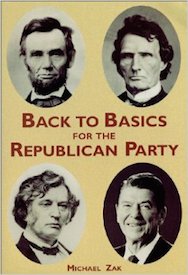Back to Basics for the Republican Party
Back to Basics for the Republican Party is a history of the party with special emphasis on its origins and development through the Reconstruction era. The book also tells the story of the Democratic Party as well as of the Whig, Greenback, and other parties. The narrative concludes during President Clinton’s second term.
Sample paragraphs: “The Republican Party is the Party of Lincoln.” Though Republican candidates may say this occasionally during campaign season, we forget just as soon as they do. What does “Party of Lincoln” actually mean? And more importantly, what should it mean, for us Republicans and the country we love?
How many Americans know why the Republican Party began or what its original purpose was? Not many! How many Americans know, for example, that the 1964 Civil Rights Act and the 1965 Voting Rights Act were reforms that the Republican Party struggled for in vain during the Reconstruction era a hundred years earlier? Fewer still. The 13th amendment banning slavery, the 14th amendment extending the Bill of Rights to the states, and the 15th amendment according voting rights to blacks — all three were enacted by the much-maligned Radical Republicans in the face of fierce Democrat opposition. How many Americans know that? Again, very few.
Now whose fault is it that so much past glory of the Republican Party goes unnoticed today? Who should we blame? Ourselves, of course. How can we hope to convince voters to place their confidence in us when we lack confidence in our own heritage? And how can we Republicans battle Democrats effectively on economic, foreign policy, and other fronts when we act as if the world began the day we were born?
To retake the ideological high ground and fight off the socialism at the core of the Democratic Party we Republicans must embrace the GOP’s original reform agenda that is at once pro-free market and pro-constitutional rights. The founders of our Party understood that to win and to deserve to win, there should be no separating the two. To understand this original vision of our Republican Party we look to the site of the 2000 Republican National Convention. Philadelphia is not only where the Constitution was written but where in 1856 the first Republican National Convention met in order to save it, for their generation unto ours.
Throughout Back to Basics for the Republican Party, we will run through our fingers the links in the chain of events between then and now. Placing events in context means reaching back to the drafting of the Constitution to describe the point of view of patriots in the 1850s who were alarmed that the slave system was extending itself northward, threatening the free market system we still cherish today.
Shocked by the Kansas-Nebraska Act, most northerners were outraged at slavery, the South, and the Democratic Party. They realized that soon territories as far north as Minnesota could enter the Union as slave states, transforming the nation’s dominant economic and social system from free market to slavery. Amid the intense reaction, so-called “anti-Nebraska” groups sprang up all across the North in early 1854 to oppose the extension of slavery into the northern territories. In hundreds of town meetings and demonstrations, Whigs, Free Soil party members, and dissident Democrats united with a single purpose: “Enough concessions to the Slavocrats! We draw the line right here. NO SLAVERY IN THE TERRITORIES.” Over the next few months these groups would coalesce into our Republican Party.
The common perception that Democrats are somehow less respectful of the Constitution, that they often revel in stretching and twisting it to suit their purposes, is valid. The misty origins of the Democratic Party lie, as we shall see, in the movement to oppose ratification of the Constitution, while most people who advocated ratification formed the Federalist Party, ancestor of our Republican Party. Democrats spent decades before and after the Civil War yammering about states rights, a doctrine they invented to preserve slavery, and used later to defend racial discrimination. In contrast, the theme of the first Republican administration was Lincoln’s struggle to “preserve, protect, and defend the Constitution of the United States”.
Today’s Republican Party places itself at an immense disadvantage. Rather than express clearly what we should be for — the free market society we Republicans won the Civil War to preserve — on too many issues, too often our Party’s policy is merely that we are against whatever Democrats are for, or perhaps we want less of it than they do. Our Party is an athlete who has lost his balance — we are in good shape, with plenty of drive, but until we regain our footing we are going nowhere.”
Tags: Back to Basics, Republican Party
- The Author

Michael Zak
Michael Zak is a popular speaker to Republican organizations around the country. Back to Basics for the Republican Party is […] More about Michael Zak.














